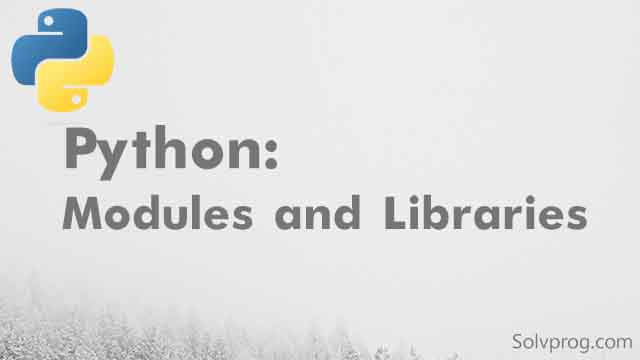Python Modules and Libraries

Python is a popular high-level programming language that comes with a large standard library that provides a wide range of functionality. In addition to the standard library, Python also has a vast ecosystem of third-party modules and libraries that extend the language's capabilities.
A module is a file containing Python definitions and statements. The file name is the module name with the suffix .py. Modules can be imported into other Python scripts or modules, allowing the code to reuse functionality from other modules.
A library, on the other hand, is a collection of modules that can be used to perform specific tasks. Libraries can be installed using package managers like pip, which allows users to download and install third-party libraries from the Python Package Index (PyPI).
Here are some popular Python modules and libraries:
- NumPy: A library for numerical computing that provides support for large, multi-dimensional arrays and matrices.
- Pandas: A library for data analysis and manipulation that provides powerful data structures and data analysis tools.
- Matplotlib: A library for data visualization that provides a wide range of plotting functions and options.
- SciPy: A library for scientific computing that provides functions for optimization, signal processing, linear algebra, and more.
- Scikit-learn: A library for machine learning that provides tools for classification, regression, clustering, and dimensionality reduction.
- Requests: A library for making HTTP requests that simplifies the process of interacting with web APIs.
- Flask: A lightweight web framework that allows developers to build web applications quickly and easily.
- Django: A full-featured web framework that provides everything needed to build complex, database-driven web applications.
- TensorFlow: A library for machine learning that provides tools for building and training deep neural networks.
- Pygame: A library for game development that provides tools for building 2D games and multimedia applications.
These are just a few examples of the many Python modules and libraries available. By leveraging these tools, developers can save time and build more powerful applications.
More information on each of the modules and libraries
Here's some more information on each of the modules and libraries I mentioned:
- NumPy: NumPy is a powerful library for numerical computing in Python. It provides support for large, multi-dimensional arrays and matrices, along with a variety of functions for performing mathematical operations on them. NumPy is often used in scientific computing, data analysis, and machine learning.
- Pandas: Pandas is a library for data analysis and manipulation in Python. It provides powerful data structures like DataFrame and Series, along with a variety of functions for manipulating and analyzing data. Pandas is often used in data analysis, data visualization, and machine learning.
- Matplotlib: Matplotlib is a library for data visualization in Python. It provides a wide range of plotting functions and options for creating high-quality, publication-ready plots. Matplotlib is often used in scientific computing, data analysis, and machine learning.
- SciPy: SciPy is a library for scientific computing in Python. It provides a variety of functions for optimization, signal processing, linear algebra, and more. SciPy is often used in scientific computing, engineering, and data analysis.
- Scikit-learn: Scikit-learn is a library for machine learning in Python. It provides tools for classification, regression, clustering, and dimensionality reduction, along with a variety of other machine learning algorithms. Scikit-learn is often used in data analysis, machine learning, and artificial intelligence.
- Requests: Requests is a library for making HTTP requests in Python. It simplifies the process of interacting with web APIs by providing a simple and easy-to-use interface. Requests is often used in web scraping, web development, and data analysis.
- Flask: Flask is a lightweight web framework for Python. It allows developers to quickly and easily build web applications using a variety of built-in tools and extensions. Flask is often used in web development, microservices, and API development.
- Django: Django is a full-featured web framework for Python. It provides everything needed to build complex, database-driven web applications, including built-in tools for database management, authentication, and more. Django is often used in web development, content management, and e-commerce.
- TensorFlow: TensorFlow is a library for machine learning in Python. It provides tools for building and training deep neural networks, along with a variety of other machine learning algorithms. TensorFlow is often used in data analysis, machine learning, and artificial intelligence.
- Pygame: Pygame is a library for game development in Python. It provides tools for building 2D games and multimedia applications, along with a variety of other multimedia-related functions. Pygame is often used in game development, multimedia development, and educational software.
Overall, these modules and libraries provide a wide range of tools and functionality for Python developers, making it easier and faster to build high-quality software and applications.